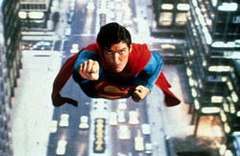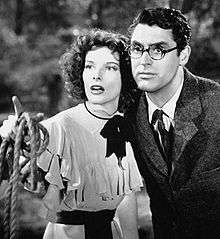Superman (Salkind films)
Superman (Kal-El) or Clark Kent is a fictional character portrayed by Christopher Reeve in the Warner Bros. Superman film series produced by Ilya and Alexander Salkind and later by Brandon Routh in Superman Returns (2006), and is an adaption of the original comic book character, Superman. Many actors were interviewed for the part before Christopher Reeve was chosen to fill the role. Superman is portrayed as a superhero who stands for "truth, justice and the American way".
| Superman Kal-El/Clark Kent | |
|---|---|
| Superman character | |
 Christopher Reeve as Superman | |
| First appearance | Superman (1978) |
| Last appearance | Crisis on Infinite Earths (2019) |
| Created by | Jerry Siegel Joe Shuster |
| Based on | Superman |
| Adapted by | Mario Puzo David Newman Leslie Newman Robert Benton |
| Portrayed by | Christopher Reeve (Original) Brandon Routh (Superman Returns) Jeff East (Young; 1st film) Lee Quigley (Young; 1st film) Aaron Smolinski (Young; 1st film) Elizabeth Sweetman (Young; 1st film) |
| In-universe information | |
| Alias | Kal-El (birth name) Clark Kent (adoptive name) |
| Species | Kryptonian |
| Abilities | Invulnerability, superhuman strength, speed, sight, and hearing, frost breath, heat vision, X-ray vision, and flight |
The character was received positively and Reeve's performance is ranked as one of the best in superhero films. Routh was later chosen to portray the original film version of the character after Reeve's paralysis in 1995 and death in 2004.
Role in the films
.jpg)
The Superman film relates the origin of Superman as it depicts baby Kal-El escaping from the doomed planet Krypton to Earth. It tells of his life in Smallville to Metropolis, where he falls in love with Lois Lane and goes up against the villain Lex Luthor. Superman II focuses more on his romance with Lois and depicts him battling the Kryptonians, General Zod, Ursa and Non. In Superman III, he is reunited with his high school crush, Lana Lang. He deals with an evil businessman who forces a computer hacker to create technology that plays havoc with the world, while turning Superman evil. Superman IV: The Quest for Peace shows Superman deciding to rid the world of all nuclear missiles. Once again he comes face to face with Luthor and his new creation from Superman's DNA called Nuclear Man.[1]
Supergirl
A spin-off film called Supergirl, based on the comicbook character Supergirl, starred Helen Slater as Superman's cousin. Christopher Reeve was originally planned to make a cameo appearance in the film but bowed out early on.[2]
Development and execution
Christopher Reeve
.jpg)
The development process behind the creation of DC Comics' character Superman in the Superman film by Mario Puzo, David Newman, Leslie Newman and Robert Benton began when Ilya Salkind bought the film rights for the character. Many A-list directors and actors were considered until Richard Donner took over the directing duties and Christopher Reeve was chosen for the part. Originally Reeve's picture and résumé was rejected many times and Reeve thought that he would not get the part after being self-described as a "skinny WASP."[3][4] His appearance was originally very slim. He refused to wear fake muscles and instead went on a training regimen, supervised by former British weightlifting champion David Prowse, which consisted of running in the morning, followed by two hours of weightlifting and ninety minutes on a trampoline. Reeve also doubled his food intake and adopted a high protein diet. He added 30 pounds (14 kg) of muscle to his thin 189 pounds (86 kg) frame. He later made even greater gains for Superman III (1983), though for Superman IV: The Quest for Peace (1987), he decided it would be healthier to focus more on cardiovascular workouts.[5] One of the reasons Reeve could not work out as much for Superman IV: The Quest for Peace was an emergency appendectomy he had undergone in June 1986.[6][7]
Reeve was never a Superman or comic book fan, though he had watched the television program Adventures of Superman starring George Reeves. Reeve found the role offered a suitable challenge because it was a dual role. He said, "there must be some difference stylistically between Clark and Superman. Otherwise, you just have a pair of glasses standing in for a character".[8]
Jeff East
Jeff East portrays teenage Clark Kent. His lines were overdubbed by Reeve during post-production. "I was not happy about it because the producers never told me what they had in mind", East commented. "It was done without my permission but it turned out to be okay. Chris did a good job but it caused tension between us. We resolved our issues with each other years later."[9] East tore several thigh muscles while performing the stunt of racing alongside the train. It took three to four hours each day to add prosthetic makeup to his face so he resembled Reeve.[9]
Portrayal and characteristics

Christopher Reeve first imagined the approach of his role on a flight to London. He felt that in the 1970s, the masculine image had changed and that it was acceptable "for a man to show gentleness and vulnerability". He also felt "that the new Superman ought to reflect that contemporary male image". Reeve would base his portrayal of Clark Kent, Superman's alter ego, on Cary Grant's performance for his role in Bringing Up Baby.[10] Superman's personality as depicted in the films is a do gooder with little or no conflict who stands for "truth, justice and the American way" — a recurring theme shared by the character in the original The Adventures of Superman radio program.[11][12] The noble Superman portrayed by Reeve, though, hides his secret identity by pretending to be an awkward and apprehensive reporter named Clark Kent. Lois Lane is indifferent to him but shares his obsession over Superman.[13] Reeve felt that even though Superman upholds "truth, justice, and the American way" there was nothing self-conscious about him — that was simply what he believed in.[1]
Themes
– Jor-El
The Superman character has been cited as a metaphor for Christ and has actions compared to many religious themes. Many have noted the examples of apparent Christian symbolism. Donner, Tom Mankiewicz and Ilya Salkind have commented on the use of Christian references when discussing the themes of Superman.[14][15] Mankiewicz deliberately fostered analogies with Jor-El as God and Kal-El as Jesus.[16] Donner is somewhat skeptical of Mankiewicz' actions, joking,"I got enough death threats because of that".[14][15]
The mythic status of Superman is enhanced by events that recall the hero's journey (or monomyth) as described by Joseph Campbell. Each act has a discernible cycle of "call" and journey. The journey is from Krypton to Earth in the first act, from Smallville to the Fortress of Solitude in the second act, and then from Metropolis to the whole world in the third act.[17]
The spacecraft that brings Kal-El to Earth is shaped in the form of a star (Star of Bethlehem). Kal-El comes to Jonathan and Martha Kent, who are unable to have children. Martha Kent states, "All these years how we've prayed and prayed that the good Lord would see fit to give us a child" — comparing her to the Virgin Mary.[14]

Just as little is known about Jesus during his middle years, Clark travels into the wilderness to find out who he is and what he has to do. Jor-El says
Live as one of them, Kal-El, to discover where your strength and power are needed. But always hold in your heart the pride of your special heritage. They can be a great people, Kal-El, and they wish to be. They only lack the light to show the way. For this reason above all, their capacity for good, I have sent them you, my only son.[14]
The theme resembles the Biblical account of God sending his only son Jesus to Earth for the good of mankind. More symbolism was seen when Donner was able to complete Superman II: The Richard Donner Cut, featuring the fall, resurrection and battle with evil, which parallels the crucifixion of Jesus, the resurrection and the Harrowing of Hell. Another vision was that of The Creation of Adam.[14]
The Christian imagery in the Reeve films has provoked comment on the Jewish origin of Superman. Rabbi Simcha Weinstein's book Up, Up and Oy Vey: How Jewish History, Culture and Values Shaped the Comic Book Superhero, says that Superman is both a pillar of society and one whose cape conceals a "nebbish", saying "He's a bumbling, nebbish Jewish stereotype. He's Woody Allen."[18][19] Ironically, it is also in the Reeve films that Clark Kent's persona has the greatest resemblance to Woody Allen, though his conscious model was Cary Grant's character in Bringing Up Baby. This same theme is mirrored in other 1940s superheroes.[18][19]
In the scene where Lois Lane interviews Superman on the balcony, Superman replies, "I never lie". Salkind felt this was an important point in the film, since Superman, living under his secret identity as Clark Kent, is "telling the biggest lie of all time". His romance with Lois also leads him to contradict Jor-El's orders to avoid altering human history, time traveling to save her from dying. Superman instead takes the advice of Jonathan Kent, his father on Earth.[15] One of the most important aspects in the first and second films was the romantic relationship between the two main characters; Clark was hopelessly in love with Lois and even gave up his powers to be with her as depicted in Superman II.[20][21]
Reception
The character and the portrayal by Christopher Reeve has garnered positive reviews from film critics and many other journalists.[22] American Film Institute ranked Reeve's take on Superman in the first film as the 26th greatest hero of all time in their AFI's 100 Years...100 Heroes & Villains list.[23] Business Insider placed Reeve's Superman as the fourth greatest superhero film performance out of twenty, while The Hollywood Reporter placed it at number three out of fifty top performances in a superhero film.[24][25] In 2009, Entertainment Weekly placed Superman third on its list of the coolest heroes in pop culture.[26] Mark Hughes of Forbes felt that Reeve portrays both Superman and Clark Kent like two different people, and that it felt like watching two different actors on the screenscreen.[27] Ben Kuchera of Polygon opined that the "performance as both Clark Kent and Superman kept the characters distinct, and it was done through his body".[28]
See also
- Superman curse
- Superman Returns - a homage sequel to the character's first two films
- Clark Kent (DC Extended Universe)
References
- "Christopher Reeve — His Legacy As Superman And Beyond Lives On (EXCLUSIVE)". Closer Weekly. September 27, 2018. Archived from the original on October 3, 2018. Retrieved October 3, 2018.
- You Will Believe: The Cinematic Saga of Superman (Redemption), Warner Home Video, 2006.
- Barry Freiman (February 2006). "One-on-One Interview with Producer Ilya Salkind". Superman Homepage. Archived from the original on July 4, 2014. Retrieved September 9, 2008.
- Richard Donner, Tom Mankiewicz, Ilya Salkind, Pierre Spengler, David Prowse, You Will Believe: The Cinematic Saga of Superman, 2006, Warner Home Video
- Harrington, Wallace; et al. "Christopher Reeve Homepage". chrisreevehomepage.com. Archived from the original on September 22, 2018. Retrieved March 15, 2019.
- Rossen, Jake. "Superman Vs. Hollywood: How Fiendish Producers, Devious Directors, and Warring Writers Grounded an American Icon." Chicago: Chicago Review P, 2008. Print.
- Anderson, Susan Heller and David W. Dunlap. "New York Day by Day; Appendectomy Centenary." The New York Times. The New York Times Company, June 26, 1986. Web. August 16, 2018.
- Bergan, Ronald (October 12, 2004). "Christopher Reeve Actor whose talent and determination to fight quadriplegia made him more than a Superman". The Guardian. Archived from the original on December 2, 2008. Retrieved March 15, 2019.
- Steve Younis (November 17, 2004). "Exclusive Jeff East Interview". Superman Homepage. Archived from the original on October 14, 2008. Retrieved September 4, 2008.
- Reeve, Christopher (1998), pp 195–197
- "The world needs Christopher Reeve's Superman". The Indian Express. April 29, 2018. Archived from the original on October 4, 2018. Retrieved October 3, 2018.
- "Truth, justice and (fill in the blank) - Editorials & Commentary - International Herald Tribune". The New York Times. Archived from the original on October 4, 2018. Retrieved October 3, 2018.
- "Look! Up on the Screen! It's 'Superman,' a Classy Cliffhanger". The Washington Post. Archived from the original on October 4, 2018. Retrieved October 3, 2018.
- Richard Donner, Tom Mankiewicz, DVD audio commentary, 2001, Warner Home Video
- Ilya Salkind, Pierre Spengler, DVD audio commentary, 2006, Warner Home Video
- Daniel Dickholtz (December 16, 1998). "Steel Dreams: Interview with Tom Mankiewicz". Starlog. pp. 67–71.
- Stucky, Mark (2006). "The Superhero's Mythic Journey: Death and the Heroic Cycle in Superman". Journal of Religion and Film. 10 (2). Archived from the original on June 18, 2013. Retrieved May 10, 2013.
- Michael Elkin (July 6, 2006). "Super ... Mensch?". The Jewish Exponent. Archived from the original on October 13, 2008. Retrieved November 1, 2008.
- "Clark Kent – Superman is 'Jewish'". Contact Music. June 20, 2006. Archived from the original on December 24, 2008. Retrieved November 1, 2008.
- Christine A. Colón, Bonnie E. Field (2009), Singled Out, Baker Publishing Group, ISBN 978-1-58743-237-8
- Tonguette, Peter (April 1, 2002). "Anti-Heroics: The Superman Films of Richard Lester". Retrieved June 17, 2010.
- "AFI|Catalog". catalog.afi.com. Archived from the original on September 14, 2018. Retrieved October 3, 2018.
- "AFI's 100 Years...100 Heroes & Villains". afi.com. Archived from the original on October 3, 2018. Retrieved October 3, 2018.
- "The 20 best superhero movie performances of all time". Business Insider. Archived from the original on August 20, 2018. Retrieved October 3, 2018.
- "Superman (Christopher Reeve) - 50 Greatest Superhero Movie Performances of All Time". The Hollywood Reporter. Archived from the original on December 26, 2018. Retrieved October 3, 2018.
- "20 All-Time Coolest Heroes in Pop Culture". Entertainment Weekly. Archived from the original on December 26, 2018. Retrieved October 3, 2018.
- Hughes, Mark. "The Best And Worst Of Superman On Film And TV". Forbes. Archived from the original on December 26, 2018. Retrieved October 3, 2018.
- "Superman's most amazing special effect didn't require computers or a green screen". Polygon. Archived from the original on December 4, 2018. Retrieved October 3, 2018.